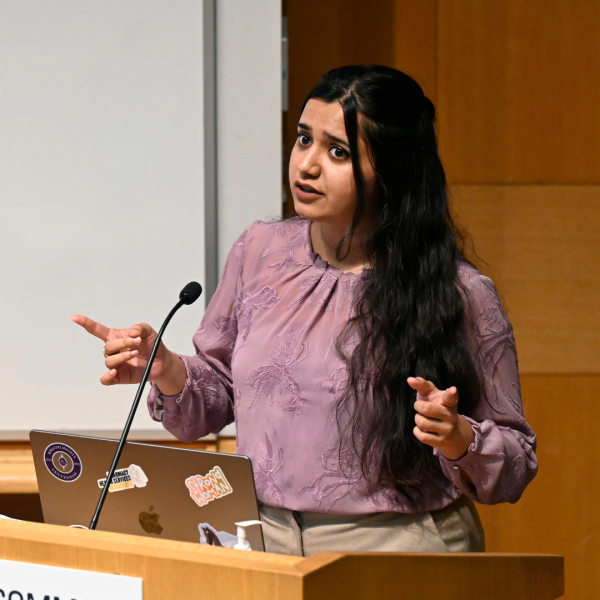Masters Alum Combines Passion for Pharmacy and Health Economics & Outcomes Research

Credits MSIPS Program for Flexibility to Follow her Passions
By: Markie Heideman, Content Marketing Manager
When Devyani Bhatnagar, MS, was searching for a Masters of Science program, she had a difficult time finding something that would accommodate her research interests in both pharmacy and health economics and outcomes. Thinking she may have to decide between those two passions, she found the perfect solution – the U-M College of Pharmacy’s Master of Science in Integrated Pharmaceutical Sciences.
“I applied because of the program's interdisciplinary curriculum,” explained Bhatnagar. “It allows you to jump between medicinal chemistry, pharmaceutical sciences and clinical pharmacy. From day one, you are able to choose your courses and create the path that’s best for you and your interests.”
And create a path, she did. Bhatnagar took a majority of her pharmacy courses in the areas of health services research and clinical pharmacy and spent time in the School of Public Health taking courses on cost-effectiveness analysis and health economics.
Health economics and outcomes research in the pharmaceutical industry helps companies analyze clinical trial data to decide that a product is valuable enough to invest in, develop budget models to determine to price for pharmaceutical products and collect data from real-world outcomes about product use – and it’s that last piece that Bhatnagar really hones in on in her research.
Building A Personalized Research Path
The interdisciplinary knowledge she gained in the classroom played a crucial role in her research thesis project with Dr. Karen Farris, which focused on opioid medications prescribed to treat pain in older cancer patients.
The research examined how opioid medications affect quality of life, as improperly monitored opioid use is often associated with issues like falling, which can increase frailty in older adults. The findings revealed that cancer patients prescribed opioids experienced worse body pain and pain interference in daily activities compared to those using other pain medications. The study also explored the utilization of opioids across a range of cancer types and found that lung cancer patients prescribed opioids for pain management reported a lower quality of life than patients with other cancer types.
She presented this research at the College of Pharmacy’s Three Minute Thesis (3MT) competition – an event open to all pharmacy graduate students willing to take on the challenge of explaining complex research in easy-to-understand terms in three minutes or less. For Bhatnagar, this was the perfect opportunity to perfect her elevator pitch.
“Having the experience of speaking in front of more than 50 people, including my professor, was very daunting, but I felt accomplished after I participated,” said Bhatnagar. “I loved having the platform to talk about my research, and I am always on the lookout for ways to improve my skills in scientific communication and explaining my research in a way that everyone can understand.”
3MT is just one way graduate students can build professional skills. In fact, professional development is a core pillar of all graduate programs through the University of Michigan – with seminars, career development sessions and talks held regularly by Rackham Graduate School.
Bhatnagar’s advice? Take part in everything you can.
“Take advantage of the opportunities the university offers. Research all of the departments and units on campus and reach out for research and fellowship opportunities. You never know all that you can do until you build a network.”
Propelling Her Career Forward
Outside of her thesis project, Bhatnagar worked as a Translational Science Immersion Fellow in the Michigan Institute for Clinical and Health Research. There, she was able to work with Dr. Lisa Prosser on a sub-project within a larger CDC-funded project – focusing on patient preferences when it comes to combination vaccines – like COVID-19 and flu.
For Bhatnager, opportunities at U-M like these have been critical to building a marketable portfolio - which, as a recent graduate of the MSIPS program, is especially important as she begins her hunt for the next opportunity.
“Having my name associated with a CDC project is incredible,” said Bhatnager. “Having opportunities to do impactful research and fellowship options that match my goals has been very beneficial.”
As she searches for her next step, she knows the foundation she built at the College of Pharmacy has set her up for success.
“What I have found so far in my conversations with potential employers is that having an education from the University of Michigan holds a lot of weight and gives me a lot of credibility especially when I can point to the types of projects I have worked on.”



